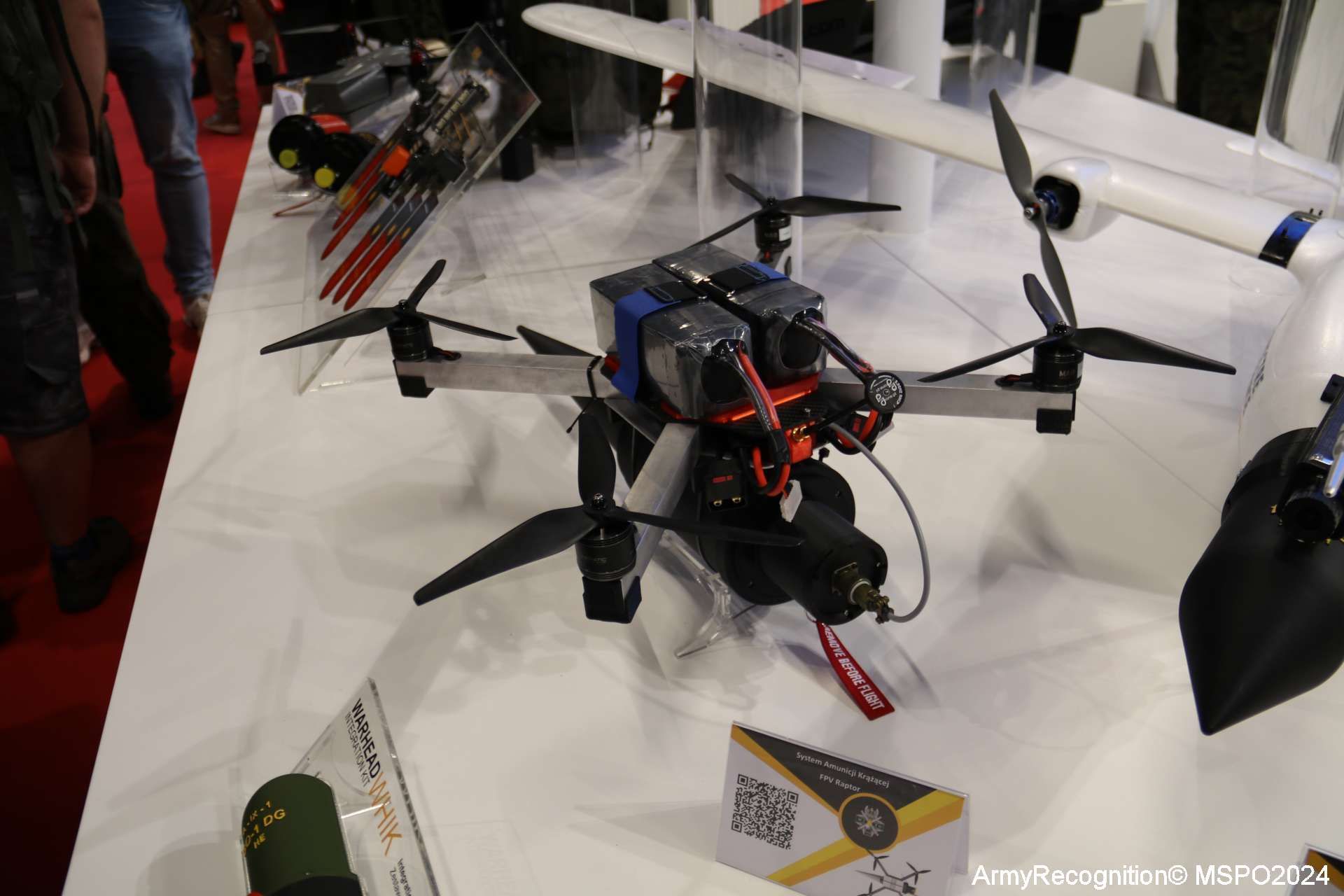Breaking News
Polish Military Institute of Technology Focuses on Low-Cost FPV Raptor Loitering Munition.
The FPV Raptor is a loitering munition system based on a vertical takeoff quadcopter platform, designed to carry combat payloads of up to 3.5 kg over a maximum distance of 20 km. Optimized for speed and production costs, the system utilizes an open infrastructure and components that can be replaced with civilian market solutions.
Follow Army Recognition on Google News at this link

Military Institute of Armament Technology (WITU) FPV Raptor Loitering Munition (Picture source: Army Recognition)
The FPV Raptor loitering munition showcased at MSPO 2024 was developed by WITU (Military Institute of Armament Technology). This system is designed for precision strikes and tactical support. The drone has dimensions of 635 x 635 x 87 mm, with a flight time of 20 minutes and a take-off weight of 7.4 kg. It can reach a maximum speed of 90 to 100 km/h and operate at altitudes up to 500 m. Its operational range is 20 km, and it can carry a maximum payload of 3.5 kg.
The FPV Raptor can be operated by a single soldier. It is equipped with a 1800TVL camera and uses configurable communications for telemetry in the 850-950 MHz range, along with digital video transmission in the 5.8 GHz band. This system stands out for its flexibility and low cost, leveraging civilian technologies adapted to military needs.
The Military Institute of Armament Technology (WITU) is a key research institute in Poland, dedicated to advancing defense technologies, including loitering munitions such as FPV drones. WITU's main objective is to modernize the Polish Armed Forces through scientific research, development, and testing of advanced weaponry. Their work in FPV loitering munitions focuses on integrating precision strike capabilities with enhanced autonomy for surveillance and combat missions. These systems aim to offer effective, cost-efficient solutions for modern warfare, leveraging high-tech technology in UAV armament and control systems.
WITU is actively engaged in developing solutions that integrate autonomous systems and AI to improve target acquisition and strike efficiency, particularly in FPV drones that allow real-time control and precision. These systems are critical in offering tactical advantages by reducing risks to soldiers while increasing operational efficiency. WITU's research aims to combine flexibility, affordability, and precision in these drones, making them suitable for both offensive and defensive missions. They are also focused on developing countermeasures to ensure that loitering munitions can operate in contested environments and resist enemy defenses.
Traditionally, loitering munitions have been fixed-wing UAVs due to their efficiency in gliding over long distances. However, quadcopters, with their vertical takeoff and landing capabilities, can also function as loitering munitions, especially in environments where flexibility, maneuverability, and vertical flight are more advantageous.
Quadcopters used as loitering munitions, like the FPV Raptor, combine the ability to hover, fly at lower speeds, and maintain a position over a target, which is useful for precision strikes. These systems often carry explosives and can loiter over an area for a period before being directed to strike a target. Although quadcopters typically have shorter ranges and flight times compared to fixed-wing loitering munitions, they excel in urban warfare, close support, and situations where agility and vertical flight are more important than long-range endurance.


























